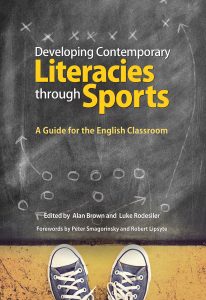This post is written by member Luke Rodesiler. This is the first of two parts.
In a Nike commercial shot in the early ’90s, professional basketball player Charles Barkley famously declared, “I am not a role model.” As one might expect, Barkley’s declaration was met with resistance. Writing for Sports Illustrated, fellow basketball star Karl Malone explained, “We don’t choose to be role models, we are chosen. Our only choice is whether to be a good role model or a bad one.”
 The idea of athletes serving as role models sticks with me after all these years because, as I think about honoring students’ interests in sports to support literacy learning, I see opportunities for teachers to leverage the literacy practices modeled by today’s top athletes. Undoubtedly, there’s great value in the book talks and recommendations teachers offer students; I don’t mean to discount those. But perhaps the sports fanatics in your classroom would also find interest in books recommended by their favorite athletes, role models such students might choose for themselves. Or maybe some reluctant readers in your classroom might be moved to read articles written by their favorite players. With those possibilities in mind, here are some resources to consider:
The idea of athletes serving as role models sticks with me after all these years because, as I think about honoring students’ interests in sports to support literacy learning, I see opportunities for teachers to leverage the literacy practices modeled by today’s top athletes. Undoubtedly, there’s great value in the book talks and recommendations teachers offer students; I don’t mean to discount those. But perhaps the sports fanatics in your classroom would also find interest in books recommended by their favorite athletes, role models such students might choose for themselves. Or maybe some reluctant readers in your classroom might be moved to read articles written by their favorite players. With those possibilities in mind, here are some resources to consider:
- In April, Indianapolis Colts quarterback Andrew Luck launched the Andrew Luck Book Club, “a forum for a book-reading community to grow through the love of reading.” Luck introduces two books at a time—one for “Rookies” (i.e., less experienced readers) and one for “Veterans” (i.e., more experienced readers)—inviting folks to read and post thoughts through various social media outlets with the #ALBOOKCLUB hashtag. Currently, rookies are invited to read Wilder’s Little House on the Prairie, and veterans are invited to read Charrière’s Papillon.
- Peter King’s weekly “Monday Morning Quarterback” column published on The MMQB features a section titled “On Your Night Table,” which offers a glimpse into the reading lives of those involved in professional football. King highlights book recommendations from those around the game, and recent suggestions have come from Baltimore Ravens receiver Steve Smith (Brett’s God Never Blinks: 50 Life Lessons for Life’s Little Detours), Atlanta Falcons coach Dan Quinn (Kerr’s Legacy: What the All Blacks Can Teach Us about the Business of Life), and Minnesota Vikings punter Jeff Locke (Huff’s How to Lie with Statistics).
- Beyond book recommendations, teachers eager to promote recreational reading habits can share with sports-minded students pieces generated by professional and amateur athletes. Though questions about the role of ghostwriters linger, The Players’ Tribune presents reflections, narratives, essays, and more attributed to athletes across the sports world. Similarly, The MMQB publishes a column titled “Behind the Face Mask,” which features first-person accounts from players, coaches, and others involved in professional football.
Like Malone, I question Barkley’s contention. I believe professional athletes can be role models; those who share their reading lives and publish their writing on the Web stand to help adolescents see how reading and writing can enrich their lives too.
In Part II tomorrow, my colleague Alan Brown will address connections between sports and adolescent male readers, an after-school program he’s launching to support literacy learning, and our new publication from NCTE, which encourages teachers to consider sports as an academic topic worthy of exploration in the secondary English language arts classroom.
 Luke Rodesiler is an assistant professor of secondary education at Indiana University-Purdue University Fort Wayne. Along with Alan Brown, he is the coeditor of Developing Contemporary Literacies through Sports: A Guide for the English Classroom, a new release from NCTE. Luke and Alan are co-chairs of the Featured Session: G.01: The Intersection of Literacy, Sports, Culture and Society.
Luke Rodesiler is an assistant professor of secondary education at Indiana University-Purdue University Fort Wayne. Along with Alan Brown, he is the coeditor of Developing Contemporary Literacies through Sports: A Guide for the English Classroom, a new release from NCTE. Luke and Alan are co-chairs of the Featured Session: G.01: The Intersection of Literacy, Sports, Culture and Society.

